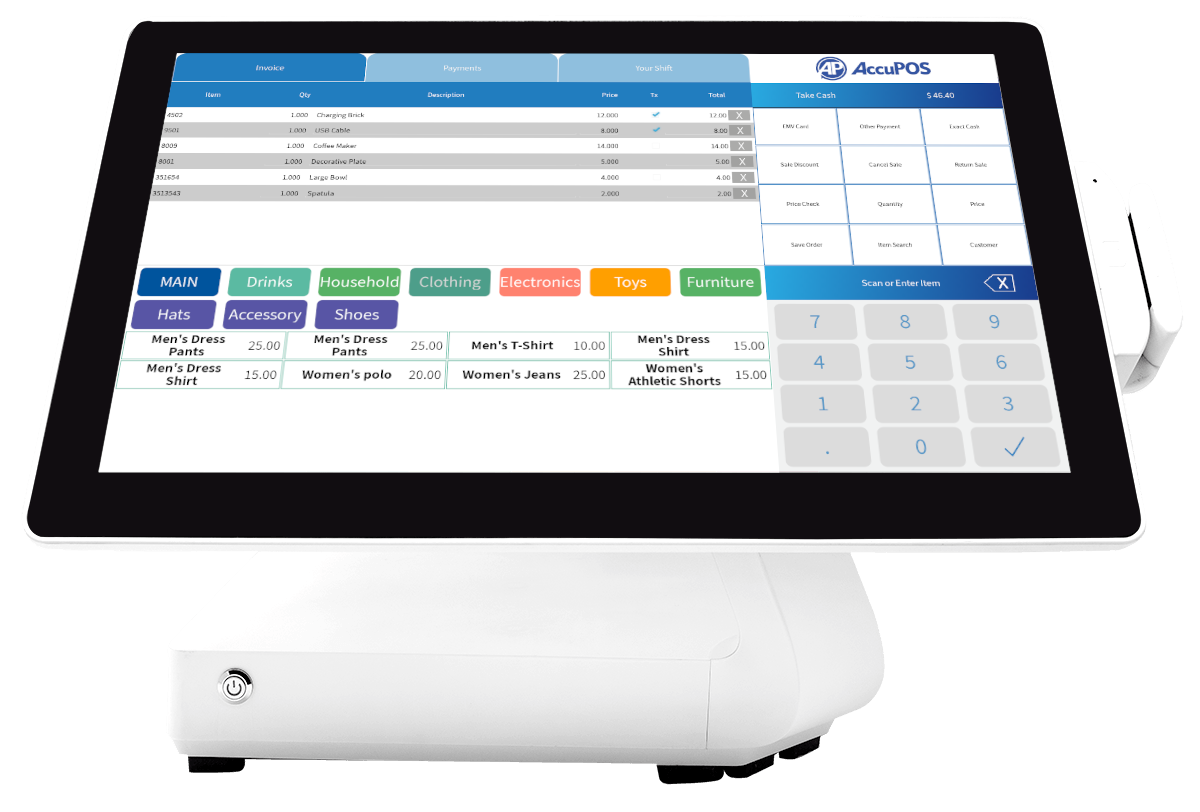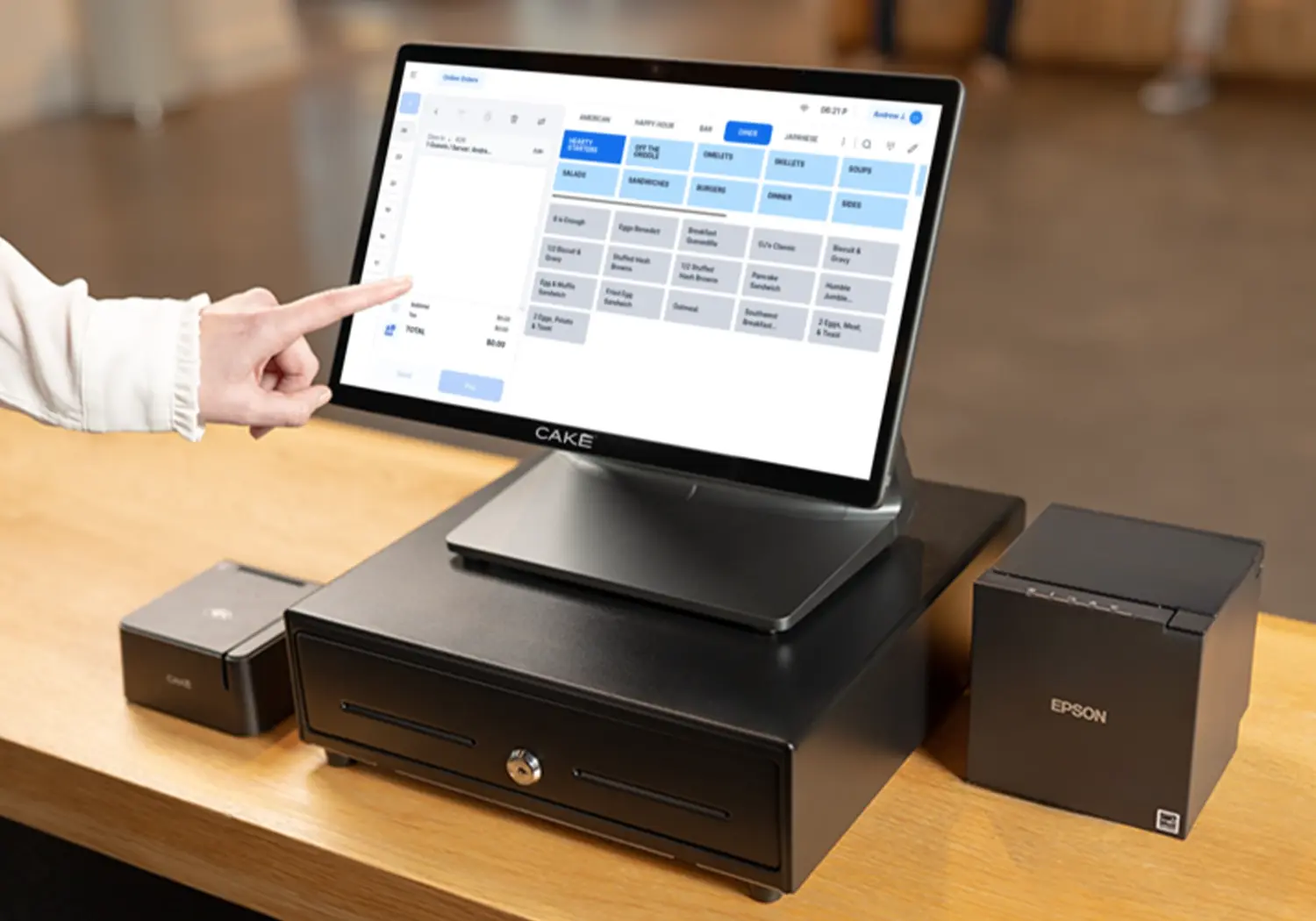The Definitive Guide for Restaurant Pos
The Definitive Guide for Restaurant Pos
Blog Article
Getting My Pos Machine To Work

Restaurant POS: Retail Point-Of-Sale Solutions Streamline Transactions
8 Simple Techniques For Point Of Sale

Hardware Components of a Point of Sale System What makes a POS system tick? It's not simply software; the hardware plays a starring role. Think about it as the body to the software's brain. Without the ideal hardware, even the most advanced POS software application is just a pretty face. Vital POS Hardware So, what are the must-haves? Let's break it down. The main processing unit, frequently a computer or tablet, is the heart of the operation. The display or touchscreen show enables personnel to connect with the system. A barcode scanner speeds up the checkout process. Keep in mind the days of by hand getting in each code? The dependable invoice printer supplies clients with a record of their purchase. A cash drawer keeps your money safe and arranged. A card reader permits consumers to pay with credit or debit cards. Diving Deeper: Beyond the Essential But wait, there's more! Depending upon your organization, you may need specific hardware. A dining establishment might include kitchen printers to relay orders, while a retail store might use label printers for item tagging. Ever question how your local bakeshop instantly prints those delicious-looking labels? Picking the Right Hardware: A Balancing Act Choosing the best hardware isn't simply about purchasing the most costly devices. It's about finding the sweet area in between performance, sturdiness, and budget. A small company just beginning might go with a more standard setup, while a high-volume seller will need robust, high-performance makers. Is it much better to buy new or used? Consider your options thoroughly. A new system uses the most recent technology and guarantee protection, but a reconditioned system can save you money. The Future of POS Hardware What does the future hold? Expect to see even more integration with mobile phones, biometric scanners for employee authentication, and advanced analytics control panels displayed on bigger, clearer screens. Imagine a world where stock is immediately updated in real-time as items are scanned-- a world where you can track your best-selling item from anywhere in the world. The possibilities are endless, and the hardware website is constantly progressing to fulfill the needs of today's services. Are you prepared to update your point of sale system?
Software Application Characteristics and Capabilities: The Heart of Your POS System
Ever view a seasoned barista move through a hectic morning rush? Their secret isn't just caffeine; it's a smooth dance with their POS system. The software application is the conductor of your company symphony, managing everything from sales to stock. What notes should you be listening for? What capabilities truly matter in today's market?
Inventory Management: Beyond Counting Beans
Forget spreadsheets that haunt your dreams. Modern POS systems provide real-time inventory tracking, alerting you when your stock of artisanal coffee beans dips precariously low. Think of it as a digital guardian angel, avoiding those uncomfortable "Sorry, we're out!" minutes to customers. What if you could also anticipate need based upon historical information? Lots of systems now offer forecasting tools, a powerful weapon against overstocking and lost sales. This helps avoid the circumstance of lacking popular products or accumulating excess stock of slow-moving items, both of which can constrain capital and area.
Sales Reporting and Analytics: Decoding the Information
Sales data is the brand-new gold, and your POS system is the miner. Forget just knowing just how much you sold today. Dive deep into the data to uncover patterns, identify your very popular products, and comprehend client behavior. Which menu item pairs completely with the everyday special? Which promotion resonated most with your clients? These insights are not just interesting; they're actionable intelligence. Without reputable sales reporting, browsing the complexities of business decision-making ends up being like cruising without a compass, increasing the chance of bad moves and missed chances.
Client Relationship Management (CRM): Building Bridges, Not Walls
Remembering a routine customer's name and preferred order is captivating, but scaling that individual touch is challenging. POS systems with CRM abilities allow you to track client purchase history, preferences, and even birthdays. Imagine instantly using a discount rate on their birthday-- a little gesture that promotes commitment and encourages repeat organization. There is the possible snag of bad information quality, which can lead to inaccurate customer profiles and ineffective marketing efforts.
Payment Processing: Improving the Transaction
The checkout experience can make or break a sale. Seamless combination with different payment approaches-- credit cards, mobile wallets, even copyright-- is non-negotiable. Can your system manage split payments? Does it use safe and secure tokenization to secure consumer data? A clunky payment process is like hitting a sour note in your business symphony, potentially disrupting the entire performance. Guaranteeing compatibility with evolving payment technologies and adherence to security requirements are vital for preserving client trust and functional performance.
Worker Management: Keeping the Team in Sync
From clocking in and out to handling authorizations and tracking performance, employee management includes simplify operations and enhance responsibility. Is scheduling a headache? Many POS systems provide integrated scheduling tools, optimizing staffing levels based on predicted demand. A common obstacle that is often ignored is the obstacle of integrating worker management functionalities with payroll systems, which can cause errors and inefficiencies in wage estimations.
Advanced Characteristics: Leveling Up Your Operations
- Table Management: Perfect for dining establishments, this feature permits you to picture your dining space, track table status, and manage reservations.
- Commitment Programs: Reward your best clients and motivate repeat business with integrated loyalty programs.
- Online Purchasing Combination: Effortlessly integrate your POS system with online ordering platforms to broaden your reach.
Picking the right POS system is about more than simply functionality; it has to do with discovering a partner that can grow with your business. Consider your current needs, expect future growth, and do not hesitate to ask the hard concerns. The ideal software application can transform your business from a chaotic cacophony into an unified masterpiece.
Industry-Specific POS System Applications
Think of the regional bakery, busy with early morning clients craving fresh croissants. A generic POS system might deal with transactions, however can it manage intricate recipes, track ingredient stock, or immediately adjust production schedules based on sales data? Most likely not. That is where the appeal of industry-specific POS systems shines.
Dining establishments and Hospitality
For bustling dining establishments, speed and precision are paramount. How many times have you seen servers managing orders, modifications, and splitting costs, all while attempting to provide excellent service? A dining establishment POS system streamlines these procedures, permitting table management, kitchen area order tickets, and even online purchasing integration. These systems frequently consist of functions like ingredient-level stock tracking, vital for handling food costs and lessening waste. Ever question why your preferred dish is in some cases unavailable? It might originate from a lack of proper inventory management.
- Table Management
- Cooking Area Order Tickets
- Online Ordering Integration
- Ingredient-Level Inventory Tracking
Retail Solutions
Retail, with its diverse stock and customer interactions, demands a various set of tools. Picture a boutique clothing store having a hard time to monitor sizes, colors, and seasonal collections using a standard checkout system. An industry-specific retail POS system provides functions like barcode scanning, client commitment programs, and in-depth sales reporting. These systems can even incorporate with e-commerce platforms, providing a smooth omnichannel experience for customers. Did you know some retail POS systems can forecast future sales patterns based upon historic data? Now that is powerful!
The Perils of an Inequality
Selecting the incorrect POS system can develop substantial functional hurdles. A clothes boutique using a restaurant POS, for example, would discover it inappropriate for managing stock with sizes and colors. The lack of proper reporting and analytics might lead to mistaken buying choices and lost revenue. The result might be similar to attempting to fit a square peg in a round hole.
Key Factors to consider
Selecting an industry-specific POS system requires careful assessment. Think of your organization's unique requirements and operational workflows. Does the system incorporate with existing software? Does it offer the required reporting capabilities? Is it scalable to accommodate future development? A well-chosen POS system is not simply a deal tool; it's a strategic asset that can drive effectiveness, enhance consumer fulfillment, and ultimately, boost your bottom line. Remember, it is a financial investment in your organization's future, not simply a cost.
Security Considerations for Point of Sale Systems
Ever heard the tale of the mom-and-pop shop that lost whatever due to the fact that of a single, overlooked security defect in their POS system!.?. !? It's a cautionary tale, and it highlights a critical element often eclipsed by the appeal of elegant features and streamlined operations. The reality is, a POS system is just as good as its security. What great is a system that crunches numbers in a flash if it allows lawbreakers to swipe customer's data just as quickly?
The Vulnerability Minefield
The digital landscape is a battlefield. Every POS system, despite size or elegance, is a potential target. Are you truly prepared for the hazards lurking around the corner? The genuine pinch comes when you discover that your outdated software application has a gaping hole that hackers can exploit, turning your service into an unwitting accomplice in identity theft. The difficulty is that hackers are crafty and are constantly changing their strategies.
Typical Security Spaces and Expert Tips
- Weak Passwords: "Password123" isn't sufficing. Use strong, unique passwords for all POS system accounts and change them frequently. Two-factor authentication is a must.
- Unsecured Networks: Your Wi-Fi resembles leaving the front door open. Secure your network with strong file encryption (WPA3 if possible) and consider a different network for your POS system.
- Outdated Software Application: Software application suppliers patch security holes all the time. Stopping working to update is like inviting trouble. Establish automated updates or schedule regular maintenance.
- Staff member Training: Your personnel is your very first line of defense. Train them to acknowledge phishing efforts, protect passwords, and report suspicious activity.
Data Encryption: Your Guard Against the Dark Arts
Consider information file encryption as a secret code. It scrambles delicate info, like charge card numbers, making it unreadable to unauthorized users. Without file encryption, your customers' monetary information resemble sitting ducks, ripe for the picking by cybercriminals. It's not simply about protecting your clients; it's about securing your track record and preventing large fines.
PCI Compliance: The Rulebook You Can't Neglect
If you accept charge card, you're bound by the Payment Card Market Data Security Requirement (PCI DSS) It's a set of security standards developed to protect cardholder information. Failing to comply can result in fines, penalties, and even the loss of your ability to process charge card payments. It's a headache, yes, however it's a required one. Believe of PCI compliance as the cost of doing service in the digital age.
Consider this: every deal processed through your point of sale is a possible entry point for malicious stars. By executing robust security procedures, you're not simply securing your company; you're securing your customers' trust and guaranteeing the long-lasting practicality of your operations. The security of your POS system isn't simply a technical issue; it's an organization important. It requires constant alertness, proactive measures, and a dedication to remaining ahead of the curve.